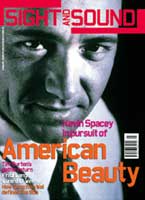Primary navigation

USA 1999
Reviewed by Mike Higgins
Our synopses give away the plot in full, including surprise twists.
Hollywood screenwriter Steven Phillips is fired by his studio employers because his latest script "lacks edge". Jack, a successful screenwriter friend of Steven's, puts him in touch with Jack's Muse: Sarah, a divine descendent of the god Zeus. She agrees to help Steven as long as he indulges her every whim at his expense, such as a suite at the luxurious Four Seasons Hotel. Steven's wife Laura is initially wary. A trip to an aquarium with Sarah proves inspirational for Steven, but a succession of other writers and film-makers occupy her time.
Sarah moves in with the Phillips family, and Steven grows envious when she inspires Laura to begin a cookie business. A second trip to the aquarium at Sarah's suggestion enables Steven to complete his screenplay. One day, a visiting psychiatrist and nurse inform Laura and Steven that Sarah is really an escapee from a mental hospital suffering from multiple-personality disorder. Sarah disappears. Steven's former studio offers to make his latest screenplay. He meets the new studio executive who commissioned it: Sarah.
For anyone not familiar with the work of the unfairly neglected director Albert Brooks, this hit-and-miss satire on the vulnerability of screenwriters reiterates some of his characteristic themes and techniques. As in Defending Your Life, myth supplies the comedy's ironic premise, while the same jaundiced view of the Hollywood machine ventured in Modern Romance is reprised here. Struggling screenwriter Steven's fractious relationship with the maternal figure of Sarah the Muse has obvious echoes of Brooks' film Mother. Unfortunately, these disparate elements cohere only occasionally in The Muse, its flagging jeu d'esprit propped up only by a clutch of amusing insider skits.
The sharpest of these involves the director-and-star's familiar persona, the Woody Allenesque harassed mensch brimming with rueful one-liners, doing futile battle with his agent and a young, bullish studio executive. However, Steven cuts a much less engaging dash away from the studio lot. Fellow-screenwriter Jack is held up as an object of envy by dint of his huge house and rolling gardens, but given Steven's own conspicuously comfortable lifestyle and happy family, his kvetching rings more than a little hollow. A good deal of the film's comedy falls victim to the same short-sightedness. While a running gag involving Sarah's inspirational collaborations with good sports Martin Scorsese, James Cameron and Rob Reiner, each playing himself, allows them to indulge in some self-deprecating amusement, a redundant sequence featuring 'celebrity' restaurateur Wolfgang Puck illustrates that the star cameo is a device best used sparingly.
Acute though some of these sketches are (Scorsese in particular caricatures himself brilliantly), they're essentially comic asides. Even though Brooks and his co-writer Monica Johnson are capable of satirical insightfulness, neither the screenplay, the casting nor the direction of The Muse does their talent justice. The insipid Andie MacDowell's Laura, for example, is disappointing enough, but her venture into cookie-making is nothing more than an extension of the character's twee housewifery. The narrative leans too heavily on the single joke that Sarah appears to inspire everyone but Steven. What's more, The Muse itself is barely a cut above the sort of screenplay Sarah eventually rouses Steven to write (a potential Jim Carrey vehicle). Only occasionally does a pertinent, if not quite subversive, observation about the Hollywood creative process puncture the surface.
As played by Sharon Stone, the capricious, demanding and selfish Sarah is less an inspiration to great art in the classical or Romantic sense than an embodiment of the big studios' corrupted values to which screenwriters must pander. (It's one of the film's better jokes that no one doubts she's the real thing, daughter of Zeus and all.) Stone's grating performance, however, blunts the point. The final revelation that all have been taken in by a mentally disturbed sanatorium escapee plays like the creaking macguffin it patently is. All in all, The Muse is a not-dishonourable addition to that genre of Hollywood satire of which The Player is the best example, but Brooks can only yet dream of Altman's complexity and assurance.